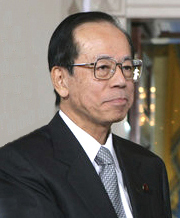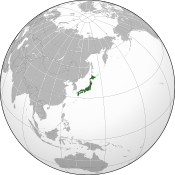Japan's Prime Minister Fukuda announces resignation
Saturday, September 6, 2008
Japan's Prime Minister Yasuo Fukuda on Monday announced his intention to resign, one month after he reshuffled his cabinet. At a press conference held from 9:30 p.m. Fukuda stated that he decided to resign, thinking the government should implement policies with a new line-up. The cabinet will resign en masse and a new prime minister will be designated. Before that, the ruling Liberal Democratic Party (LDP) will elect a new President.
Since the July 2007 election (to replace half the members) in the upper house, the ruling bloc (LDP and New Komeito) has been minority, while being overwhelming majority in the lower house since the 2005 General Election. Fukuda took over Shinzo Abe as a LDP President, and became Japan's Prime Minister on September 26, 2007.
Surprise announcement
At the Monday conference Fukuda, age 72, noted that some matters important to people's life should be deliberated in the upcoming extraordinary Diet session, such as a supplementary budget and a draft to set up a new agency of consumer affairs. Fukuda criticized the main opposition Democratic Party of Japan (DPJ) for uncooperativeness in the annual Diet session (earlier this year) with tactics to delay deliberations. Fukuda said he thought the government must be well ready formed to attend the upcoming Diet session.

Image: Chris Greenberg.
Fukuda's predecessor Shinzo Abe also suddenly showed resignation last year, later confessing his health problems. Questioned about the similarity, Fukuda replied he had no particular health problem except his poorer eyesight, and emphasized he considered how the course of politics should be before he made this decision.
Fukuda's announcement came half a day after Ichiro Ozawa, the President of the main opposition DPJ, expressed his will to seek a third term.
Early resignation
After hosting Hokkaidō Tōyako Summit in July, Fukuda reshuffled his cabinet on August 2. At the Monday conference Fukuda was questioned about his view on this early resignation, and Fukuda replied it was natural he was asked why. Fukuda continued that at the time of the reshuffle he had eagerness at least for important matters, those on economy in particular, and he thought they were settled by the last weekend, somehow or other. Fukuda explained he changed his mind, taking into account various political situations of this one month, with hope for the upcoming Diet session to be run smoothly.
Now it's clear Fukuda won't choose dissolution of the lower house. Japan's next lower house General Election should be held no later than September, 2009.
Fukuda's self-appraisal
Looking back on his 11 months, Fukuda said he undertook the job last September knowing there lay difficulties in his way, after the ruling bloc lost majority in the upper house as a result of the July 2007 election. Fukuda said he was very busy from the beginning handling longstanding problems that surfaced one after another, including the issue of mismatched or lost pension records and the scandals as to the Ministry of Defense. Fukuda noted that he, despite such troubles, maybe not outstandingly, put his hand to some reforms from the public perspective, such as generalization of the revenue earmarked for roadways affairs, draft-making for a new consumer agency, drastic review of social security systems.
Reactions
Below are reactions of Japanese politicians shown on the Monday night.
The ruling bloc
- Akihiro Ōta, New Komeito Chief Representative, said he was surprised, mentioning that Fukuda informed him of resignation on the phone at 9:00 p.m. He disclosed Prime Minister on August 29 showed him forward-looking will like saying "let's visit shopping arcades together" when he referred to people's tight life. "So, it was really a sudden, honestly I was surprised."
The opposition
- Yukio Hatoyama, Secretary General of the Democratic Party of Japan, said it was extremely irresponsible for Fukuda to give up the administration one month after reshuffling the cabinet, even after setting the date of convocation of the Diet for the extraordinary session. He questioned why Fukuda didn't accept people's voice, "make the lower house dissolved, call a General Election."
- Kazuo Shii, Japanese Communist Party Chair, said "it's natural the next prime minister will make the lower house dissolved and call a General Election to face the jury of the people, but first we should thoroughly discuss fundamental problems of the national politics to make the issues clear." He described give-up by two prime ministers in succession as the proof that LDP-New Komeito regime came to an ultimate standstill.
- Mizuho Fukushima, the leader of Social Democratic Party, defined Fukuda's cabinet as a cabinet throwing away the people. She said "Prime Minister Fukuda throwing off the responsibilities, LDP plucking down a prime minister for an election, neither is thinking about the people a bit." She noted "LDP is switching the administration for an election" and showed her strong hope for a General Election.
- Hisaoki Kamei, secretary general of the People's New Party, said it was irresponsible, to the people and the Diet, as a top leader, for Fukuda to resign though Fukuda showed the will to keep the administration by reshuffling the cabinet. He noted he couldn't but say LDP, repeating such a thing to cause confusion among the people, now lost qualification and ability as a party in power. He expressed his intention to seek a General Election.
Sources
- "太田氏“突然で驚いた”" — NHK, September 2, 2008 (Japanese)
- "鳩山氏“きわめて無責任”" — NHK, September 2, 2008 (Japanese)
- "志位氏“基本問題 徹底議論”" — NHK, September 2, 2008 (Japanese)
- "福島氏“国民投げ捨て内閣”" — NHK, September 2, 2008 (Japanese)
- "亀井氏“あまりにも無責任”" — NHK, September 2, 2008 (Japanese)
- "首相退陣表明:気力も失い投げ出し 公明攻勢で引導" — Mainichi Shimbun, September 2, 2008 (Japanese)
- "首相退陣表明:「政治的空白生じさせてはならぬ」会見要旨" — Mainichi Shimbun, September 2, 2008 (Japanese)
- "Media Q&A session with Prime Minister Fukuda" — Mainichi Shimbun, September 2, 2008
- "Fukuda announces resignation as prime minister of Japan" — Mainichi Shimbun, September 1, 2008
- "福田内閣の歩み、当面の政治日程" — Asahi Shimbun, September 1, 2008 (Japanese)
- "Japan PM Fukuda resigns in surprise move" — Agence France-Presse, September 1, 2008
- "Japan PM in surprise resignation" — BBC, September 1, 2008
- "首相会見〈2〉「小沢代表と胸襟開き話したかった」" — Asahi Shimbun, September 1, 2008 (Japanese)
- "民主・小沢氏、代表選出馬を正式表明 3選確定へ" — Asahi Shimbun, September 1, 2008 (Japanese)



